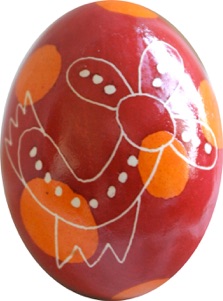Podillia
Поділля
Podillia
Поділля

Podillia is a large ethnographic region located in central right bank Ukraine. The eastern areas were first settled during the time of the Trypillian culture. More recently, large parts of Podillia formed the easternmost reaches of Austrian and Polish “Galicia.” Today it is divided among three oblasts: Ternopil, Khmelnytsyi, and Vinnytsia. The area is largely agricultural, with rich chornozem.
The design/motif is quite characteristic of western Podillia, where pysanky bearing representations of the ancient gods were preserved well into the 20th century. It is of the sort called “kucheri” by Manko. In this case it is a kucher/curl with a crown and wings. This is one of the old representations of the great goddess, and the “kachur (drake/male duck)” name is also a common one.
Onyshchuk appears to have taken this design directly from Binyashevsky (p. 38 L), and modified it a bit:


Binyashevsky provides no further ethnographic information in the book. The color scheme is a bit less characteristic; these pysanky were usually written on a dark background. It is possible that the original had a less vivid red.
The dots/blobs of color are also characteristic of western Ukraine, and of western Podillia. The Hutsuls called these dots “slezy” (tears). There were usually red in color, although they could be multicolored or, as in this case, orange. The dots of western Podillia are usually smaller than those of the Hutsuls, but it could depend on the pysankarka, too. They were usually created by dripping wax on to the egg; they were a way of adding more color to a pysanka without a lot more work.

Drake (male duck)
Technical details: This is a nice simple pattern for beginners, although it requires a fair amount of waxing in. It is free-form, so errors don’t matter as much. Use a medium to heavy stylus for outlines, heavy for waxing in and making the “splotches.”
Note a mistake: the dots in the body seen in the first egg were not included on the second egg. Oops!
The design utilizes two dyes: orange and red. I would still recommend dyeing the egg in yellow as a first color, as it will provide a good base for the other dyes. Use a mix of UGS scarlet and red dyes for your red, to get a deep, rich color.
While the dots/slezy were traditionally done by dripping beeswax onto the egg, it is easier and less messy just to write the outlines randomly on the shell, and then fill in with a heavy stylus.
This is a simple lateral division; the design on the back should mirror the one on front.
Download these pattern sheets:
Back to MAIN Patterns page.
Back to MAIN Regional Pysanky page.
Back to MAIN Traditional Pysanky page.
Search my site with Google
Drake (Duck)
Качур
